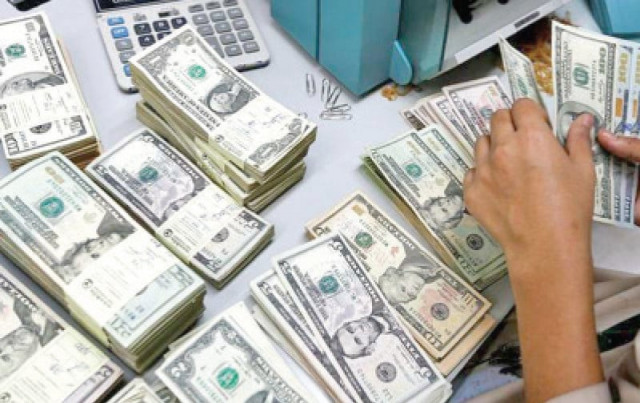Govt set to pay $27.5b debt by Nov
Another IMF programme may be required to ensure smooth debt repayments

The central bank has reported that Pakistan has to pay $27.47 billion in foreign debt and interest cost over one year till the end of November 2024 and arrangements have already been made to pay a large proportion of the debt under the IMF loan programme.
Talking to The Express Tribune, Optimus Capital Management Research Analyst Maaz Azam said Pakistan was all set to acquire another IMF loan programme to ensure smooth repayment of debt after the ongoing standby arrangement ended in March 2024.
At the same time, there was a pressing need to execute plans for increasing export earnings and the inflow of workers’ remittances as well as attract higher foreign investment to lessen reliance on new debt, he said. “Payments ($27.47 billion) are slightly larger compared to the average payment outlook of $20-22 billion over the next 12 months, as per the central bank data,” Azam said.
“The caretaker government has established the Special Investment Facilitation Council (SIFC) to attract foreign investment and reduce reliance on external debt. Likewise, it has approved the privatisation of Pakistan International Airlines (PIA) to bring foreign investment.”
The SBP data breakdown suggests that the country has to repay foreign debt of $23.83 billion from December 2023 to November 2024 and make interest payment of $3.64 billion during the same time period.
The bank said in its latest update on Wednesday that $4.29 billion worth of debt and interest cost had to be paid in December 2023 alone.
Between January and February 2024, Pakistan has to pay another $3.47 billion and from March to November 2024, it will pay $19.71 billion, according to the bank.
Azam said Pakistan could not afford any political and economic instability and needed to ensure stability on both fronts to generate resources and continue to make required payments on time.
He projected that Pakistan would require an additional $5-6 billion to finance its current account deficit over the next one year, as “we need to increase imports of raw material to boost economic activities to the required level.”
The next IMF loan programme will provide the much-needed cushion to bridge the estimated current account gap. Besides, a long-term programme of three years or more would give time to the country to undertake necessary reforms like increasing the tax-to-GDP (gross domestic product) ratio and providing incentives to exporters to reduce reliance on debt in the long run, he said.
Read Rs908b added to public debt in Nov
In December 2023, SBP Governor Jameel Ahmad announced that Pakistan had to pay a sum of $24.6 billion in foreign debt and debt servicing by the end of June 2024.
He revealed that the payment included the rollover of $12.4 billion. Out of this, the rollover of $9.3 billion had already been confirmed by the creditors.
Azam quoted Ahmad as saying in December that Pakistan would repay around $4.3 billion in principal loans and $2.5 billion in interest cost (from December 2023 to June 2024).
Forex reserves drop
The central bank said in its latest weekly update on Thursday that the country’s foreign exchange reserves, held by the SBP, decreased $66 million to $8.15 billion in the week ended January 5, 2024 “due to debt repayments.”
In the prior two weeks, the reserves had jumped 19%, or $1.33 billion, to five-and-a-half-month high at $8.22 billion on inflows from multilateral creditors.
The net reserves held by commercial banks stood at $5.10 billion in the week ended on January 5. Accordingly, the total liquid foreign reserves held by the country stood at $13.26 billion, according to the bank.
Interest rate falls
Topline Securities CEO Muhammad Sohail reported that interest rates in Pakistan had gone down 4% in the past four months.
He said the benchmark lending rate (six-month Karachi Inter-bank Offered Rate – Kibor) came below 21% on Thursday, almost one-year low, after T-bill yields fell to 20.6% amid hopes for the beginning of the policy rate cut phase by the SBP.
Published in The Express Tribune, January 12th, 2024.
Like Business on Facebook, follow @TribuneBiz on Twitter to stay informed and join in the conversation.



















COMMENTS
Comments are moderated and generally will be posted if they are on-topic and not abusive.
For more information, please see our Comments FAQ